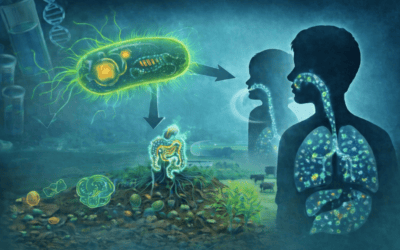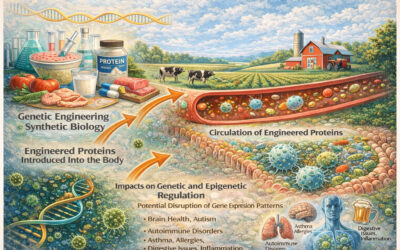Article by Michelle Perro, MD, Stephanie Seneff, PhD, and Zen Honeycutt BFA
 Introduction
Introduction
Consumer groups, GMOScience, Moms Across America, and supporters have commissioned the testing of Girl Scout cookies for toxic metals and glyphosate/AMPA (an herbicide and its byproduct), to promote awareness and positive change for health. The results were extremely concerning.
- 100% of the samples were positive for glyphosate
- 100% were positive for toxic metals
- 22 out of 25 (88%) of samples were positive for all 5 toxic metals
- 76% were positive for levels of cadmium that exceed EPA limits in water
- 24 out of 25 (96%) of samples were positive for lead
(The consumer groups involved reached out to the GSUSA for a meeting before releasing these results and did not receive a response.)
One hundred percent of the 13 types of 25 cookies tested from 3 states, California, Iowa, and Louisiana, were positive for very elevated levels of glyphosate/AMPA, responsible for multiple health issues including cancer, endocrine disruption, gut issues, miscarriages, sperm damage, autism, neurotoxicity, and reproductive damage.
Glyphosate is commonly used as a drying agent (also known as a desiccant) before harvesting on wheat, oats, barley, legumes, sugar cane, and other crops, and as a weed killer on GMO crops such as corn, soy, canola, and beet sugar, which are common ingredients in the cookies. From 13.57 ppb in Peanut Butter Patties® to 111.07 in Thin Mints®, the average amount is 33.43, 334 times higher than what Dr. Don Huber, Professor Emeritus of Purdue, states is harmful and must be avoided.
Summary
One hundred percent of the cookies contained at least 4 out of 5 heavy and toxic metals, aluminum, arsenic, cadmium, lead, and mercury. The Peanut Butter Patties® were the most contaminated, ranging from the lowest level of mercury at .07 ppb of mercury to the highest levels of lead at 42.5 ppb and aluminum, at 27.5 ppm (27,500 ppb). The source of the high levels of aluminum is unclear. However, non-organic peanut crops are one of the most highly sprayed crops with some of the most toxic chemicals. Of the samples tested, 22 out of 25 (88%) were positive for all 5 toxic metals. Thin mints had the highest levels of glyphosate, and the peanut butter patties had the highest levels of toxic metals.
Seventy-six percent of the cookies tested positive for levels of cadmium that exceeded EPA limits in water, and 96% of the cookies contained lead. There is no safe level of lead. Cadmium and lead have been linked to cancer and brain disorders.
Girl Scout Cookie Sales and the Girl Scouts USA Organization
 The sale of cookies containing potentially toxic ingredients raises profound ethical and public health concerns. It is imperative for the Girl Scouts organization to confront this issue by addressing critical questions regarding their capacity and willingness to reformulate these products to ensure consumer safety. Moreover, a thoughtful examination is required to determine whether acknowledging and responding to the need for such changes aligns with the organization’s core values and its commitment to promoting the health and well-being of the girls and communities it seeks to empower. Such action would not only safeguard public trust, but also reinforce the organization’s dedication to its foundational mission.
The sale of cookies containing potentially toxic ingredients raises profound ethical and public health concerns. It is imperative for the Girl Scouts organization to confront this issue by addressing critical questions regarding their capacity and willingness to reformulate these products to ensure consumer safety. Moreover, a thoughtful examination is required to determine whether acknowledging and responding to the need for such changes aligns with the organization’s core values and its commitment to promoting the health and well-being of the girls and communities it seeks to empower. Such action would not only safeguard public trust, but also reinforce the organization’s dedication to its foundational mission.
With more than 1.7 million girl members and approximately 700,000 volunteers, the Girl Scouts works to build “courage, confidence, and character” in young girls.1 Therefore, one could also assert that changing the ingredients would indeed be in alignment with their stated values. An analysis of their finances reveals that they have the financial means to attain these goals.
In 2020, the Girl Scouts reported total revenue of $112 million, a slight decline from $122 million in 2019. This revenue was primarily derived from three key sources: Membership dues, which accounted for $50 million; investment income, royalties, and gains totaling $28 million; and the sale of inventory, contributing $17 million.2 Notably, according to a Fox News article, the sale of Girl Scout cookies represents an $800 million annual enterprise, with scouts collectively selling over 200 million boxes each year.3

According to the Girl Scouts USA (GSUSA), the net proceeds from their cookie sales are given to the local groups which had total sales to chartered councils of $10,149,000 in fiscal 2021.4 The decline in revenue was attributed to decreased sales during Covid. Clearly the Girls Scouts USA organization has the resources to spend a little more money on better quality ingredients.
Let’s take a look back in history, how did America’s most treasured girl’s empowerment group end up with such toxic cookies?
The History of Girl Scout Cookies
A Brief Overview of the Girl Scout History and Its Support for Young Women
A look back in history regarding the development and support of girls shows that it has its origins in the Girl Scouts. This commitment to fostering opportunity and unlocking potential for young women is deeply woven into the fabric of American history.
In 1912, Juliette Gordon Low founded an organization in Savannah, Georgia, sparking a nationwide movement that aimed to empower every girl to reach her fullest potential. Remarkably, this initiative began before women were even granted the right to vote, demonstrating an enduring belief in the limitless possibilities for young women long before they were recognized as equals under the law.5
The origins of Girl Scout cookies trace back over 100 years ago to the early 20th century, when resourceful young scouts and their leaders sought innovative ways to fund their growing programs. In 1917, a group of Girl Scouts from Muskogee, Oklahoma, baked and sold homemade cookies to raise money for local troop activities—a simple yet brilliant idea that would become a beloved American tradition.
 By the 1930s, Girl Scout councils across the country had adopted the practice, and by 1936, commercial bakers were enlisted to meet the growing demand. What began as a grassroots effort to support leadership opportunities for girls evolved into one of the most beloved fundraisers in American history.
By the 1930s, Girl Scout councils across the country had adopted the practice, and by 1936, commercial bakers were enlisted to meet the growing demand. What began as a grassroots effort to support leadership opportunities for girls evolved into one of the most beloved fundraisers in American history.
As per their mission statement, selling Girl Scout cookies is created to be synonymous with community spirit and entrepreneurial education, teaching girls the fundamentals of business, teamwork, and goal setting, while connecting them to a larger legacy of service and self-reliance. This iconic tradition is designed to empower future generations. Is this beautifully stated vision manifested in their cookies?
However, with this inspired legacy, why did we decide to look in between the cookie wafers and take a peak as to what else might be inside those cookies?
 The Role of Non-Governmental Agencies
The Role of Non-Governmental Agencies
The first priority is identifying who is responsible for ensuring the quality of products our children consume.
Regulatory agencies are a misnomer and should be re-identified as captured agencies. Governmental organizations given the task of oversight of quality of ingredients in commercial foods (especially those aimed at children) have not fulfilled their commitment. Citizen scientists have stepped in to study everything from baby food, infant formulas, school lunches, and gluten-free products.6
Another example of how regulatory agencies have handed over the hen house to the foxes is best demonstrated by the oversight freedom granted to the Impossible Burger®. The FDA initially turned down the plant-based burger genetically engineered to taste like meat produced by GMO yeast cells, but then later granted the manufacturer the ability to police their own products without further testing.7
Groups such as ours involved in the research into the Girl Scout Cookies have witnessed, as have many others, this lack of oversight and have stepped in to provide detailed insight into what is being fed to our children, securing food safety, and, simultaneously, creating opportunities for change when necessary.
ARE ALL GIRL SCOUT COOKIES MADE EQUAL?
Not all Girl Scout cookies are produced by the same kitchens. According to an article by the Los Angeles Times, cookies can vary by name, taste, and design. The two main companies making the cookies are ABC Bakers and Little Brownie Bakers. You can even type in your zip code to have a look at the origin of the cookies you are consuming.
Cookies with the same name, but made by different bakers, can vary greatly in their appearance and ingredients. These differences also affect their calorie count, as well as their fat, sugar, and protein content. This is best illustrated by the S’mores below:8
There are significant differences between the two S’mores, with the Little Brownie Bakers making a healthier cookie. It is appreciated that these macronutrients have been quantified; however, our interest extended to those ingredients that are “unintended” and “unidentified.”
Because of these regional differences, we chose to look at cookies from different parts of the US, including cookies from Iowa, Louisiana, and California. We examined the cookies from those three locations for toxic metals (aluminum, arsenic, cadmium, lead, and mercury) and for the herbicide glyphosate and its breakdown product, AMPA (aminomethylphosphonic acid).
Our findings are listed in Part II of this exposé.
Part II: The Data
The Girl Scouts, Cookies, and Toxicants – What Are the Links?
This is not the first time Girl Scout Cookies have been put under the microscope. Leah Segedie, of Mamavation, published an article critiquing Girl Scout Cookies back in 2015, and she discovered many concerning issues.9 She listed primary ingredients of concern as high fructose corn syrup, GMO sugar from sugar beets, palm, cottonseed oil, soybean oils, caramel color, the thickening agent carrageenan, and artificial flavors. Most of these ingredients are core ingredients of the processed food industry, and some are known to be carcinogenic.
Our concerns are about the potential toxic contaminants that are not intended or listed as ingredients, but substances that inadvertently got into the cookies either through unsafe farming practices or during processing. We conducted a small study on 25 samples of the typical Girl Scout cookie offerings across the US from three different regions of the United States, where we specifically focused on glyphosate/AMPA and toxic metals. We felt that our results were alarming, and they raised larger concerns about the safety of many other brands of cookies that are likely manufactured using similar practices.
The health implications of toxic substances in cookies extend beyond the immediate impact on our girls and affect the public at large. Identifying and eliminating the sources of these toxic metals is imperative to safeguarding public health. Transitioning to organic ingredients would effectively address the issue of pesticide contamination, providing a cleaner and safer product.

The findings below reflect levels of glyphosate and it’s toxic breakdown product, AMPA, from Louisiana, Iowa, and California:

Girl Scout Cookie Heavy Metal Test results

Part III: An Opportunity for Education to Regeneration and a New Badge
Upon encountering this news, many may focus solely on the harmful impact these toxicants pose to public health or the potential damage they could inflict on the reputation and sales of Girl Scout Cookies, along with the broader implications for the girls involved in the organization. Staff members, too, might view this information through a personal lens, worrying about the impact on their livelihoods and possibly perceiving the testing as an intentional effort to undermine their roles. However, such a perception would be unfounded. Our testing aims not to harm, but to ensure the safety and integrity of products associated with the organization’s mission.
The mission of our coalition is to make the invisible visible, bringing attention to these hidden dangers.11 This challenge also presents an opportunity for the Girl Scouts to demonstrate leadership and set a standard of excellence by ensuring the highest quality and safety in some of America’s favorite cookies. We are working to expose the toxicants in beloved Girl Scout cookies to raise nationwide awareness of the unintentional and detrimental impact of toxic agrochemical mono-crop farming, as well as raise awareness about the benefit of regenerative organic farming.
The current farming system utilizes drying agent chemicals to dry the wheat crop before harvesting. These chemicals do not entirely wash, dry, or cook off, and remain in the wheat berry, sugar, corn, soy, and canola oil ending up in our cookies. The fertilizers used in agro-chemical farming can also contain petroleum by-products and toxic metals. Roundup,12 (and other glyphosate-based herbicides), the most widely used herbicides in the world, have been found to contain toxic metals such as arsenic.13
The real problem is not that these toxicants are in the cookies, but that they are allowed to be in the majority of our food supply, and there has not been enough political will and usage of the manufacturer’s purchasing power to change.
In other words, when most people see this news they will only think of the problems this causes for them. We invite the public and the Girl Scouts to not only see the problem but also be part of the solution.
A compelling solution lies in fostering education among Girl Scouts and the American public regarding the far-reaching impacts of agrochemical farming. This practice contributes to the contamination of a wide array of consumables, including cookies, wine, beer, breastmilk, hummus, cereal, school lunches, and fast food, while also degrading our soils and jeopardizing the sustainability of future agricultural practices. Addressing this issue through informed advocacy and awareness can help mitigate these pervasive challenges and protect both environmental and public health.
Can the Girl Scouts maintain their market share despite growing concerns about the safety of their cookies? With both perceptions and actual data about their products being unsafe, the organization faces a significant challenge. Adding to the pressure, healthier “copycat” cookies—modeled after the financial success of Girl Scout cookies—have entered the market, offering consumers alternatives that prioritize organic ingredients. This shift could threaten the Girl Scouts’ dominance in the space, especially if they fail to address safety concerns and adapt to changing consumer preferences for healthy options. Presently, there are a plethora of websites offering home-baked varieties Girl Scout Cookie recipes encouraging the present cooking-and-baking-from-scratch trend.
Once we have identified the problem, we can find solutions and take action.
Most parents and GSUSA executives would likely agree that one must be willing to examine our problems, whether they be in our education system, office management, personal relationships, or our cookies, to make improvements.
The solution is organic, regenerative farming.
Organic and regenerative farming does not allow toxic chemicals like glyphosate, 2,4-D, dicamba, and paraquat. When toxic chemicals are eliminated, the microbiome of the soil is healthier, and weeds are less prevalent. Weeds are also suppressed with cover crops like beans and other legumes that create a natural mulch and add nutrient content to the soil such as nitrogen. Regenerative farmers also utilize livestock which naturally fertilize the soil when they graze the field before planting, eliminating the need for synthetic chemical fertilizers that contaminate the crops. Regenerative organic farming does not utilize harmful chemicals and regenerates the soil organic matter, improving the health of the soils, crops, and consumers of the crops. We have a huge and exciting opportunity before us.
The Girl Scouts could lead the way in transforming our food and farming system by championing toxic-free, nutrient-dense cookies made with organic and regeneratively grown ingredients. Selling 200 million cookies each year, primarily made of wheat flour, equates to a buying power of over 2.2 million bushels of wheat at a market price of $7.15 per bushel which equals approximately 16 million dollars worth of wheat.14
If the GSUSA chose to inform their suppliers that they are transitioning to only organically and regeneratively grown wheat within a reasonable time frame, they would expect to see a drastic reduction in toxicants and a rise in nutrients within a year or two. The girls of Girl Scouts, and their parents, could be confident to be a part of a courageous organization that cares about their character, integrity, and responsibility for their fundraising products and the health of our nation.
We invite the Girl Scouts of America, their supporters, and parents to contact the Girls Scouts organization to lead the way in supporting the transition of America’s wheat farming to organic and regeneratively grown wheat, without glyphosate or other toxic chemicals used as drying agents, and fertilizers contaminated with toxic metals.
Girl Scouts can educate their girls to be leaders in creating soil health, improved crop health, and non-toxic, nutrient-dense foods that nourish America and support a thriving country!

A Look at Global Imperatives to Protect Girls and Women
In July 2024, Special Rapporteur Marcos Orellana delivered a critical message to the 79th session of the United Nations General Assembly, issuing a stern warning on the urgent need to protect girls and women from the dangers of hazardous substances and waste. Orellana’s report emphasized that women and girls are disproportionately affected by exposure to toxic chemicals, e-waste, and harmful pollutants, which pose severe risks to their health, safety, and well-being. He called for decisive global action to address these threats, highlighting the ethical and legal responsibilities of nations to ensure that women and girls are shielded from environmental harm.15
Women Engage for a Common Future is a global influential organization dedicated to advancing women’s leadership, with a focus on addressing the critical intersection of environmental and social justice. With a particular emphasis on chemical and waste policies in Africa, the organization develops and implements educational programs that empower communities to engage with these pressing issues. By raising awareness and building capacity, they enable women to take leadership roles in shaping sustainable chemical and waste management practices, driving meaningful policy changes that support women and the planet.16
In 2021, the World Health Organization (WHO) issued a powerful call for “binding action” to protect women and children from the hazardous effects of e-waste and toxic recycling practices at digital dumpsites. These sites, often located in vulnerable communities, expose individuals to harmful chemicals that pose serious health risks, particularly for children and women.
The WHO’s call underscores the urgent need for global policy interventions to mitigate the growing chemical burden these dumpsites impose, advocating for comprehensive and enforceable measures to safeguard the health of those most at risk. By addressing the toxic consequences of improper e-waste disposal, the WHO seeks to protect future generations from the environmental and health dangers associated with the digital age.17
Despite the above three examples of global initiatives from reputable organizations declaring the need to protect our women and children from toxicants, the looming question is: How well are these goals being met?

Frequently Asked Questions
“...if the test results were reproducible, and what type of peer review you did"
Transparency and scientific rigor are central to our work, and we appreciate your diligence in assessing the reliability of our findings. One member of our team is an MIT research scientist with hundreds of publications authored by her. We also have educators, physicians, philanthropists, artists, activists, moms, farmers, and designers who were involved in our process.
Our testing followed stringent, validated methodologies to ensure accuracy and reproducibility. We utilized an independent, ISO-accredited laboratory specializing in food contaminant analysis. The testing protocols adhered to standardized procedures for detecting toxicants, including [e.g., mass spectrometry) with rigorous controls to eliminate cross-contamination and false positives. Additionally, we employed chain-of-custody documentation to maintain sample integrity from collection to analysis. The main laboratory utilized is Health Research Institute in Fairfield, Iowa, owned by a renowned researcher and author.
While our findings have not yet undergone formal peer review in a scientific journal, the laboratory methods used are widely accepted in toxicological and food safety research. Furthermore, our results align with broader studies highlighting the presence of contaminants in processed foods, reinforcing their credibility.
Prior to releasing our data, we made multiple attempts to engage the Girl Scouts organization in a dialogue regarding our findings. Unfortunately, we did not receive a response. Our primary concern is the health and well-being of children, particularly in relation to their food intake, rather than the reputation of the Girl Scouts. This issue presents a significant opportunity for the organization to take a leadership role in child nutrition by developing organic, regenerative cookies that align with their mission of empowering young girls.
In our article, we explicitly invited the Girl Scouts to collaborate on creating a healthier product—one that reflects the values of sustainability and well-being that the organization promotes. Notably, all those involved in this research effort were former Girl Scouts, making this initiative not just a scientific endeavor, but a deeply personal one as well. We even designed a new badge and created educational opportunities regarding nutrition for the Girl Scouts and the need for organic regenerative food programs.
We understand the gravity of these findings, particularly in the context of products marketed to children, and we fully support further independent verification. Anyone who would like additional details on our methodologies, we are happy to provide further technical documentation to facilitate informed discussion and action.
“... why only 'a small study' was conducted on 25 samples as opposed to something larger?"
A profound note of gratitude and appreciation to Ruth Westreich – The Westreich Foundation: (https://thewestreichfoundation.org)
In The News
Girl Scout cookies may contain heavy metals. Why is our food like this? – USA Today – March 15, 2025
Girl Scouts sued over alleged heavy metals, pesticides in cookies – Manhattan Daily – 3/11/25
Lady Scouts sued over alleged heavy metals, pesticides in cookies – Tech Alex – 3/11/25
Scientists discover toxic ingredients linked to autism in 100% of Girl Scout Cookies – News Today – 2/18/25
Toxic Chemicals in Girl Scout Cookies Exposed – The Highwire – 2/13/25
Study Finds That Girl Scout Cookies Are Toxic – The Highwire – 2/10/25
Los científicos descubren ingredientes tóxicos vinculados al autismo en el 100% de las galletas de Girl Scouts – Punto de Encuentro – 2/4/25
‘Operation Outbreak’: CDC Grooming Teens, Kids to Fear Pandemics, Critics Say – Children’s Health Defense – 2/6/25
Toxic Metals, Glyphosate Found in Girl Scout Cookies – Conexiant Endocrinology – 2/4/25
Scientists discover toxic ingredients linked to autism in 100% of Girl Scout Cookies – Daily Mail – 2/3/25
Girl Scout Cookies found to contain toxic metals and glyphosate: Study – The Hearty Soul – 2/4/25
AUTHORS
Michelle Perro, MD, CEO, gmoscience.org
Zen Honeycutt, Founding Executive Director, momsacrossamerica.org
Stephanie Seneff, PhD, stephanieseneff.net
References
- https://paddockpost.com/2021/08/29/executive-compensation-at-the-girl-scouts/
- Ibid
- https://www.foxbusiness.com/lifestyle/girl-scout-cookies-what-to-know
- https://www.charitywatch.org/charities/girl-scouts-of-the-usa-national-office
- https://www.girlscouts.org/en/discover/about-us/history.html
- https://www.momsacrossamerica.com/gluten_free_food_test_results
- https://gmoscience.org/2020/02/19/a-closer-look-at-the-impossible-burger-is-the-impossible-possible/
- https://graphics.latimes.com/girl-scout-cookies/
- https://www.mamavation.com/featured/girl-scout-cookies-peddling-poison.html
- https://www.canada.ca/en/health-canada/programs/consultation-aluminum-drinking-water/document.html
- https://hrilabs.org/
- https://www.momsacrossamerica.com/arsenic_and_heavy_metals_found_in_world_s_most_popular_weed_killer
- https://gmwatch.org/en/news/archive/2018/18061-glyphosate-herbicides-contain-toxic-heavy-metals-including-arsenic
- https://www.ers.usda.gov/webdocs/outlooks/108773/whs-24c.pdf
- https://www.ohchr.org/en/documents/thematic-reports/a79163-gender-and-hazardous-substances-report-special-rapporteur
- https://www.wecf.org/event/integrating-gender-equality-womens-leadership-in-chemical-and-waste-policies-programs-in-africa-brs-cops-side-event/
- https://www.who.int/publications/i/item/9789240023901

 Introduction
Introduction The Role of Non-Governmental Agencies
The Role of Non-Governmental Agencies


